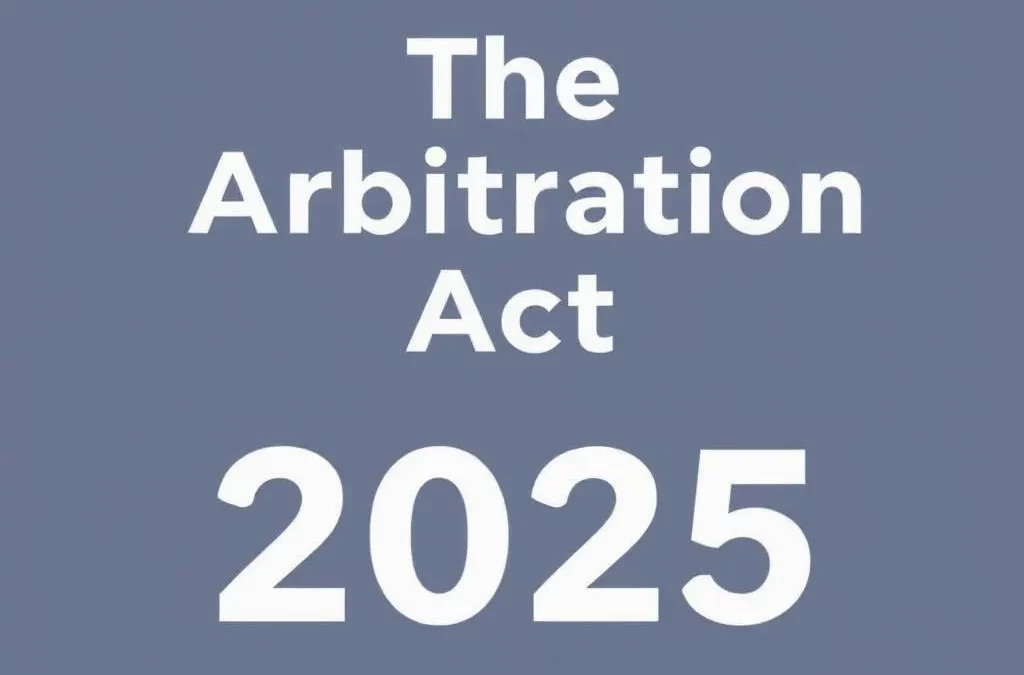
The Implications of Recent U.S. Government Policies on the Russia-Ukraine War
April 9, 2025
Old Tricks for New Cases: Leveraging Your Prior Learning in Law School
April 14, 2025
Article written by Laetitia Ponde Nkot
The Arbitration Act 2025 (2025 Act) revises and modernises the Arbitration Act 1996 (1996 Act). According to the government’s press release, the objective of the new Act is to ‘strengthen Britain’s status as the premier location for resolving disputes outside of court.’ While the new Act results from a review and consultation by the Law Commission, its intent has been to make adjustments rather than implement a comprehensive reform, ensuring that the UK continues to be a leading hub for commercial arbitration.
The newly established statutory framework will be pertinent to a considerable number of individuals using The London Court of International Arbitration (LCIA). Consequently, the LCIA has been proactive in ensuring that the legislative foundation for arbitration is suitable and supportive of international arbitration practices.
The changes clarify several various critical aspects that influence arbitrations conducted by the LCIA and the broader framework of international arbitration.
Jurisdictional law relevant to the arbitration agreement
The 2025 Act brings forth Section 6A, which outlines a new default rule regarding the law applicable to arbitration agreements. This rule stipulates that the law of the arbitration’s seat will apply to the arbitration agreement unless the parties explicitly agree to a different law. Additionally, Section 6A clarifies that the choice of governing law for the main contract, which includes the arbitration agreement, does not imply that the same law automatically applies to the arbitration agreement itself.
Section 6A addresses uncertainties and complexities stemming from the Supreme Court’s ruling in Enka v Chubb. Under the current English legal framework, following the Supreme Court’s ruling in Enka v Chubb, an arbitration agreement is usually governed by the law of the underlying contract unless stated otherwise.
By replacing the common law rule with a clear default position, it diminishes the chances of disputes regarding the law applicable to the arbitration agreement.
Establishment of the obligation for arbitrators to disclose relevant information
Under the 2025 Act, arbitrators are legally required to disclose any situations that may reasonably raise legitimate concerns about their impartiality, as detailed in Halliburton v Chubb. This provision is mandatory, meaning that parties cannot waive it by mutual agreement. It also imposes an ongoing duty of disclosure that applies even before the arbitrator accepts the appointment and it specifies that the duty encompasses relevant circumstances that the arbitrator should reasonably be aware of.
Summary disposal
The 2025 Act introduces a new Section 39A, which permits the tribunal to grant a summary award regarding a claim or specific issue upon a party’s request, unless the parties have reached a different agreement. This provision applies if the tribunal finds that a party has ‘no real prospect of succeeding’ on the claim or issue, or in defending against it. Likewise, the Early Determination provisions outlined in Article 22.1(viii) of the LCIA Rules come into play when a claim, defense, counterclaim, cross-claim, defense to counterclaim, or defense to cross-claim is considered ‘inadmissible’ or ‘manifestly without merit.’
Authority of the Tribunal for Expedited Dismissal
The 2025 Act enables tribunals located in London to promptly dismiss claims or defences that show ‘no real prospect of success.’ This approach mirrors the threshold test utilised for summary judgment employed in the English courts.
Expanded Judicial Powers for Interim Relief
The 2025 Act effectively eliminates the longstanding ambiguity surrounding the authority of English courts to grant interim relief orders against third parties in the context of arbitration. The updated regulations specify that, in the absence of an alternative agreement between the parties, courts have the same authority to provide relief against third parties in arbitration proceedings as they do in traditional court litigation.
Restricted Court Review of Jurisdictional Disputes
Presently, section 67 of the 1996 Act requires that jurisdictional challenges to awards be examined through a complete de novo review by the English courts. The upcoming 2025 Act will introduce a restricted review process in situations where:
- The tribunal has already made a determination on a jurisdictional objection;
- The party contesting the award participated in the arbitration proceedings.
In light of this revised process:
- New jurisdictional objections may not be raised in the English courts unless they could not have been identified with reasonable diligence during the arbitration;
- New evidence will only be allowed if it could not have been submitted earlier with reasonable diligence;
- Previously submitted evidence will not be reconsidered unless deemed necessary by the court in the interest of justice.
This modification is anticipated to shorten the time and financial burden associated with numerous jurisdictional challenges in the English courts.
Enhancing the immunity of arbitrators in relation to their resignation and removal from office
Arbitrators shall not be held liable (i) for resigning, except in cases where it is shown to be unreasonable, and (ii) for the costs incurred from a petition or motion for their removal, unless they have engaged in bad faith conduct.
Emergency arbitrators
The 2025 Act amends the arbitration structure by incorporating provisions for emergency arbitrators. It stipulates that when parties consent to arbitration rules that facilitate the appointment of an emergency arbitrator, such as those outlined in Article 9B of the LCIA Rules, and such an appointment is made, the emergency arbitrator is empowered to issue a peremptory order. This order is enforceable by the court if a party fails to comply with the emergency arbitrator’s directives, unless the parties have made alternative arrangements.
Moreover, Section 44 has been revised to enable the emergency arbitrator to authorise a party to seek court permission, for example, concerning the gathering of witness testimony.
The legislation thus strengthens the position of emergency arbitrators as defined in the LCIA Rules. Article 9B allows parties to submit a request for the appointment of an emergency arbitrator, whose responsibilities are limited to providing emergency interim relief until the formation of the permanent tribunal that will adjudicate the merits of the case, which may fall ‘manifestly outside the jurisdiction of the Arbitral Tribunal.’
Major oversights
Section 69 of the 1996 Act, which pertains to appeals concerning awards based on legal issues, remains unchanged. This section specifically lets the parties to either opt out or mutually agree that there is no right to appeal an award grounded on a legal question. By agreeing to govern the arbitration in conformity with the LCIA Rules in a London venue, and as long as such a waiver is not prohibited by any relevant law, the parties agree to relinquish ‘any form of appeal, review, or recourse to any state court or other legal authority’ (Article 26.8).





